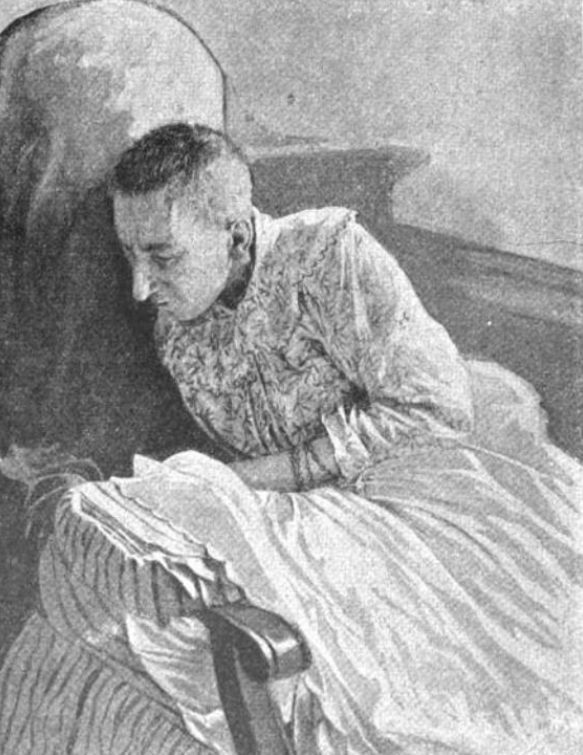A quarter-century of captivity ended when an anonymous letter exposed one of France’s most shocking family secrets
The anonymous letter that arrived at the Paris Attorney General’s office in May 1901 contained accusations so disturbing they demanded immediate investigation. Someone had written to report that a woman named Blanche Monnier had been imprisoned in deplorable conditions for twenty-five years—not in some distant dungeon, but in her own family home.
What authorities discovered when they forced their way into the Monnier residence in Poitiers would become one of the most notorious cases of family abuse in French legal history, revealing how social expectations and maternal control could transform into something monstrous.

A Promising Young Woman’s Disappearance
Blanche Monnier’s story began conventionally enough in 1870s France. Born in 1849 to Charles and Louise Monnier, she grew up in Poitiers as part of an established bourgeois family with deep community ties. Her mother, Louise, enjoyed local respect for philanthropic activities, while her late father had held academic positions. Brother Marcel pursued legal studies, eventually securing government employment.
Blanche herself possessed the qualities that made young women desirable in Victorian society—beauty, intelligence, and spirited personality. By her mid-twenties, she attracted numerous suitors and seemed destined for an advantageous marriage that would further elevate her family’s social standing.
Then, in 1876, she simply disappeared from public view.
The Explanation That Satisfied No One
When friends and acquaintances inquired about Blanche’s absence, Louise Monnier provided vague explanations. Her daughter had “gone away,” she claimed, or was traveling extensively. As months stretched into years, most people assumed Blanche had relocated permanently, perhaps abroad.
The explanations satisfied casual curiosity but couldn’t explain why a prominent family’s daughter would cut all contact with her social circle. In an era when correspondence maintained relationships across distances, Blanche’s complete silence should have raised more questions.
Instead, her absence gradually became accepted fact. The vivacious young woman who once attended social gatherings and legal lectures had simply vanished from collective memory, her fate known only to those closest to her.

The Anonymous Revelation
Twenty-five years later, someone finally broke the conspiracy of silence. The letter that reached legal authorities in Paris contained specific allegations that demanded investigation, describing conditions that seemed impossible in civilized society.
When police arrived at the Monnier villa, Louise initially refused entry, apparently hoping to maintain the deception that had lasted decades. Officers eventually forced their way inside, following an overwhelming stench to a locked attic door.
What they found defied contemporary understanding of maternal devotion and family loyalty.
The Horror in the Attic
Behind the padlocked door lay Blanche Monnier, now in her early fifties, reduced to skeletal proportions in conditions of unimaginable squalor. Weighing barely fifty-five pounds, she lay naked on a mattress of rotted straw, surrounded by decomposing food scraps and human waste.
The woman who had once been described as charming and vivacious could barely tolerate the daylight streaming through windows that officers pried open. Her hair, uncut for decades, reached her knees in matted tangles.
According to police reports, Blanche had scratched desperate messages into the filthy walls: “Shall I ever regain my freedom, or am I to be for ever consigned to this living tomb?” The words captured a psychological torment that matched her physical deterioration.
The Motive Behind Madness
Louise Monnier’s eventual confession revealed motivations rooted in class prejudice and maternal obsession. The imprisonment had begun, she claimed, as punishment for Blanche’s romantic attachment to a man deemed unsuitable—a lawyer who lacked both wealth and aristocratic connections.
What began as intended temporary confinement had evolved into permanent captivity. Even after Blanche’s suitor died in 1885, Louise refused to release her daughter, perhaps unable to admit the enormity of her actions or unwilling to face social consequences.
The case illustrated how Victorian-era expectations about proper marriages could become weapons of family control, with devastating results for those who refused to comply.
Legal Consequences and Social Reaction
Public outrage following Blanche’s discovery was immediate and intense. Louise Monnier faced arrest but died in custody just fifteen days later, reportedly from cardiac arrest brought on by stress. Some accounts suggest her final words concerned her daughter: “Ah, ma pauvre Blanche.”
Brother Marcel, charged as an accessory, initially received fifteen months imprisonment but successfully appealed his conviction. Courts ruled that despite his legal education, he lacked sufficient mental capacity to intervene effectively, and existing laws provided no clear “duty to rescue” requirement.
The legal outcomes satisfied few observers, who saw privileged family members escaping full accountability for crimes that shocked national conscience.

Recovery and Lasting Mystery
Against medical expectations, Blanche survived her rescue and showed remarkable psychological resilience during hospitalization. Her first reported words upon breathing fresh air—calling it “lovely”—demonstrated an appreciation for simple freedoms that most people take for granted.
The identity of her anonymous rescuer remains unknown, despite decades of speculation. Some historians suggest a former servant or military acquaintance might have finally acted on long-held suspicions, but no definitive evidence has emerged.
Historical Significance
The Monnier case became a touchstone for discussions about family authority, individual rights, and social responsibility in early twentieth-century France. Nobel Prize-winning author André Gide immortalized the story in his 1930 book “La Séquestrée de Poitiers,” ensuring its place in literary as well as legal history.
The case also highlighted limitations in legal frameworks designed to address domestic abuse, particularly when perpetrators occupied respected social positions. Laws that might protect strangers from imprisonment offered little recourse for family members trapped by those they should have been able to trust most.

Enduring Questions
More than a century later, aspects of Blanche Monnier’s ordeal remain incompletely understood. Contemporary newspaper accounts varied in reliability, and key witnesses died before providing complete testimonies. The exact daily conditions of her captivity, the degree of outside knowledge about her situation, and the specific trigger for her eventual rescue continue generating historical debate.
What remains undisputed is the extraordinary human cost of rigid social expectations combined with unchecked family authority. Blanche’s quarter-century of suffering serves as a stark reminder that domestic spaces can become prisons when love transforms into control, and when societal pressure to maintain appearances overrides basic human compassion.
Her story continues resonating today, not merely as historical curiosity but as testament to the resilience of human spirit under impossible circumstances—and warning about the devastating consequences when families become battlegrounds for competing visions of honor, duty, and love.





